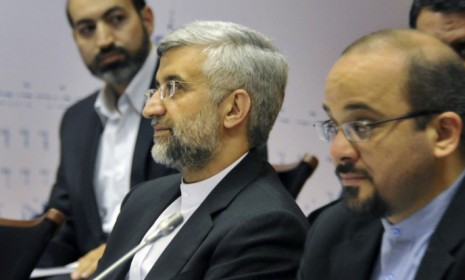3 ways Iran's nuclear talks could actually succeed
Renewed negotiations between Iran and six other countries are off to a rocky start. Here's how leaders could ensure that diplomacy prevails this time around

A free daily email with the biggest news stories of the day – and the best features from TheWeek.com
You are now subscribed
Your newsletter sign-up was successful
A third round of negotiations over Iran's controversial nuclear program opened Monday in Moscow, and the tense first day of discussions did not appear promising. Tehran says it will stop enriching uranium to 20 percent purity — just below weapons grade — but not until world leaders ease up on harsh sanctions and recognize its right to enrich uranium for civilian purposes. But the six world powers involved in the talks (United States, Russia, China, France, Britain, and Germany) won't budge until Iran agrees to export all of its nuclear fuel and prove that it will live up to an agreement to end its quest for nuclear weapons for good. Is there any hope these talks will lead to a breakthrough? Here, three ways the negotiations could actually succeed:
1. Don't let up on sanctions, and Iran will cave
"The sanctions are harming Iran's economy," says Jeremy Herb at The Hill, because they're finally hitting where it hurts — the oil industry. President Obama argues that the tougher economic measures are what "brought Iran back to the negotiating table." Iran is desperate to get the U.S. to lift sanctions targeting the Iranian central bank, and to head off a European Union ban on Iranian oil taking effect in July. But they aren't likely to loosen the noose until Tehran gives them what they want.
The Week
Escape your echo chamber. Get the facts behind the news, plus analysis from multiple perspectives.

Sign up for The Week's Free Newsletters
From our morning news briefing to a weekly Good News Newsletter, get the best of The Week delivered directly to your inbox.
From our morning news briefing to a weekly Good News Newsletter, get the best of The Week delivered directly to your inbox.
2. Just keep everyone talking
Given the high stakes and the history of failed talks, says Daniel Levy at Britain's Guardian, just keeping everyone at the table will make Moscow a success. Slowly building "mutual understanding" could make it possible by year's end to strike a deal that will "deliver a partial enrichment freeze in return for partial sanctions relief." That won't end the Iranian nuclear threat for good, but it would prevent a surge that would give Tehran its first atomic bomb, and keep Israel's fighter planes on the ground, both of which should be considered victories.
3. We need to throw Tehran a bone
Simply negotiating a deal to keep negotiating isn't enough, says Dennis Ross at The New Republic. Every minute the diplomats talk, Iran keeps enriching and "the clock toward the 'zone of immunity' the Israelis fear keeps ticking." Every inch closer Iran gets to the point where nothing can stop it from acquiring the bomb, Israel's incentive to hold off on a military strike against Tehran's nuclear facilities weakens. So let's go directly to the heart of the matter and "offer Iran a civil nuclear power capability." If they take the deal, crisis averted. If they say no, the world will have its proof that Tehran's intentions are anything but peaceful.
A free daily email with the biggest news stories of the day – and the best features from TheWeek.com
-
 How the FCC’s ‘equal time’ rule works
How the FCC’s ‘equal time’ rule worksIn the Spotlight The law is at the heart of the Colbert-CBS conflict
-
 What is the endgame in the DHS shutdown?
What is the endgame in the DHS shutdown?Today’s Big Question Democrats want to rein in ICE’s immigration crackdown
-
 ‘Poor time management isn’t just an inconvenience’
‘Poor time management isn’t just an inconvenience’Instant Opinion Opinion, comment and editorials of the day